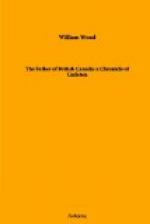‘The Affair at the Cedars’ thus became a sorely vexed question. In itself it would have died out among later and more important issues if it had not been used as a torch to fire American public opinion at a time when the Congress was particularly anxious to make the Thirteen Colonies as anti-British as possible. Most of Forster’s men were Indians. He had reminded Butterfield how dangerous an increasing number of Indians might become. Butterfield was naturally anxious to prove that he had yielded only to overwhelming odds and horrifying risks. Americans in general were ready to believe anything bad about the Indians and the British. The temptation and the opportunity seemed made for each other. And so a quite imaginary Indian massacre conveniently appeared in the American news of the day and helped to form the kind of public opinion which was ardently desired by the party of revolt.
The British evidence in this and many another embittering dispute about the Indians need not be cited, since the following items of American evidence do ample justice to both sides. In the spring of 1775 the Massachusetts Provincial Congress sent Samuel Kirkland to exhort the Iroquois ’to whet their hatchet and be prepared to defend our liberties and lives’; while Ethan Allen asked the Indians round Vermont to treat him ’like a brother and ambush the regulars.’ In 1776 the Continental Congress secretly resolved ’that it is highly expedient to engage the Indians in the service of the United Colonies.’ This was before the members knew about the Affair at the Cedars. A few days later Washington was secretly authorized to raise two thousand Indians; while agents were secretly sent ’to engage the Six Nations in our Interest, on the best terms that can be procured.’ Within three weeks of this secret arrangement the Declaration of Independence publicly accused the king of trying ’to bring on the inhabitants of our frontiers the merciless Indian savages.’ Four days after this public accusation the Congress gave orders for raising Indians along ’the Penobscot, the St John, and in Nova Scotia’; and an entry to that effect was made in its Secret Journal. Yet, before the month was out, the same Congress publicly appealed to ’The People of Ireland’ in the following words: ’The wild and barbarous savages of the wilderness have been solicited by gifts to take up the hatchet against us, and instigated to deluge our settlements with the blood of defenceless women and children.’
The American defeats at Quebec and at the Cedars completely changed the position of the two remaining commissioners. They had expected to control a victorious advance. They found themselves the highest authority present with a disastrous retreat. Thereupon they made blunder after blunder. Public interest and parliamentary control are the very life of armies and navies in every country which enjoys the blessings of self-government. But civilian interference is death. Yet Chase




